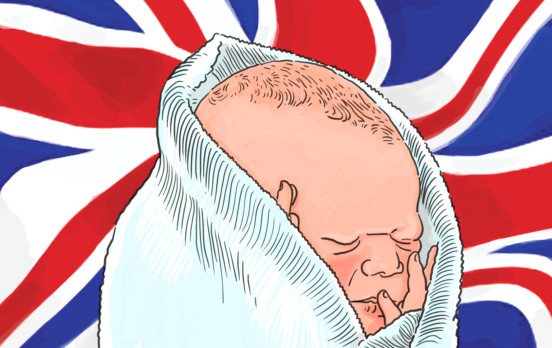
Can an infant affect the global power of a nation in the 21st Century? He can, if he is a Windsor born in Britain this week. Not perhaps the way a male Tudor heir would have affected Britain’s balance with Spain five centuries ago, but Prince George affects Britain’s soft power in the world. For better or worse, the monarchy still matters in global politics.
The British monarch, of course, is the head of the 54-nation Commonwealth and even where she is no longer head of state, the royal brand still stirs some hearts and sells some products. And in the US, the land of revolting colonials where George III is still a villain in the schoolbooks and many pundits have (mistakenly) pronounced the end of the special relationship, people arose early to watch the royal wedding and now celebrate the birth of the new prince. Television anchors gush with enthusiasm. Even before this week’s event, a CBS/New York Times poll reported in 2011 that 71 per cent of Americans thought the royal family “a good thing” and only 15 per cent were against it. This is remarkably similar to the monarchy’s 77 per cent approval rating at home.
We live in a celebrity era and the monarchy has managed to hold its own in competition with rock stars and athletes. In an information age, where power is not only a function of whose army wins, but also whose story wins, the monarchy has provided a compelling narrative with more durability than the 15 minutes of fame enjoyed by celebrities who lack its institutional trappings.
Britain has recently been enjoying a good innings in the soft-power league. Not only have the BBC and the British Council kept their international reputations for credibility, but the successful London Olympics and Paralympics provided a beneficial burst of public relations. In its 2012 rankings of countries’ soft power, Monocle magazine argued that Britain had displaced the US in the top slot.
The British government is beginning to pay more attention. The 2010 Strategic Defence and Security Review and National Security Strategy stressed the value of soft power in response to the problems involving defence cuts, and William Hague, Foreign Secretary, has argued for the importance of soft power as a “vital component” of the UK’s international role. A House of Lords committee on soft power and the UK’s influence is holding hearings. Certainly, the monarchy should be one of the instruments they examine.
What are the costs and benefits of the monarchy as an instrument of soft power? Next year’s Sovereign Grant for the royal family will be about £36 million (Dh202.45 million). Critics complain that this does not fully account for security and travel costs, but even if the estimate were doubled, it would be a mere pittance compared with other expenditures in the defence budget. Britain’s relatively few republicans complain that the social costs of anchoring a vestigial aristocratic class system is much more important, but this raises constitutional and political issues that go far beyond soft power.
Soft power — the ability to produce outcomes through attraction rather than coercion or payment — is not a panacea. But neither is hard power, as we discovered in Iraq. If one wishes to depose a regime or roll back an invasion, hard power is necessary. But if one’s objective is to foster democracy or human rights, soft power may be more effective. And in most cases, a smart power strategy depends upon the mutually reinforcing combination of hard and soft-power resources. The cultivation of soft-power resources of legitimacy and goodwill can create a favourable environment.
Promoting attractive images of one’s country is not new, but the conditions for trying to create soft power have changed dramatically in recent decades. For one thing, nearly half the countries in the world are now democracies. In such circumstances, diplomacy aimed at public opinion can become as important to outcomes as the traditional classified diplomatic communications among leaders. Information creates power and today a much larger part of the world’s population has access to that power. Technological advances have led to dramatic reduction in the cost of processing and transmitting information.
The result is an explosion of information and that has produced a “paradox of plenty”. Plentiful information leads to scarcity of attention. One of the great ironies of this century is that the democratic remains of a once hierarchical monarchy are still a very cost-effective way of attracting attention for Britain today.
— Financial Times
Joseph Nye is a professor at Harvard University and author of Presidential Leadership and the Creation of the American Era.










